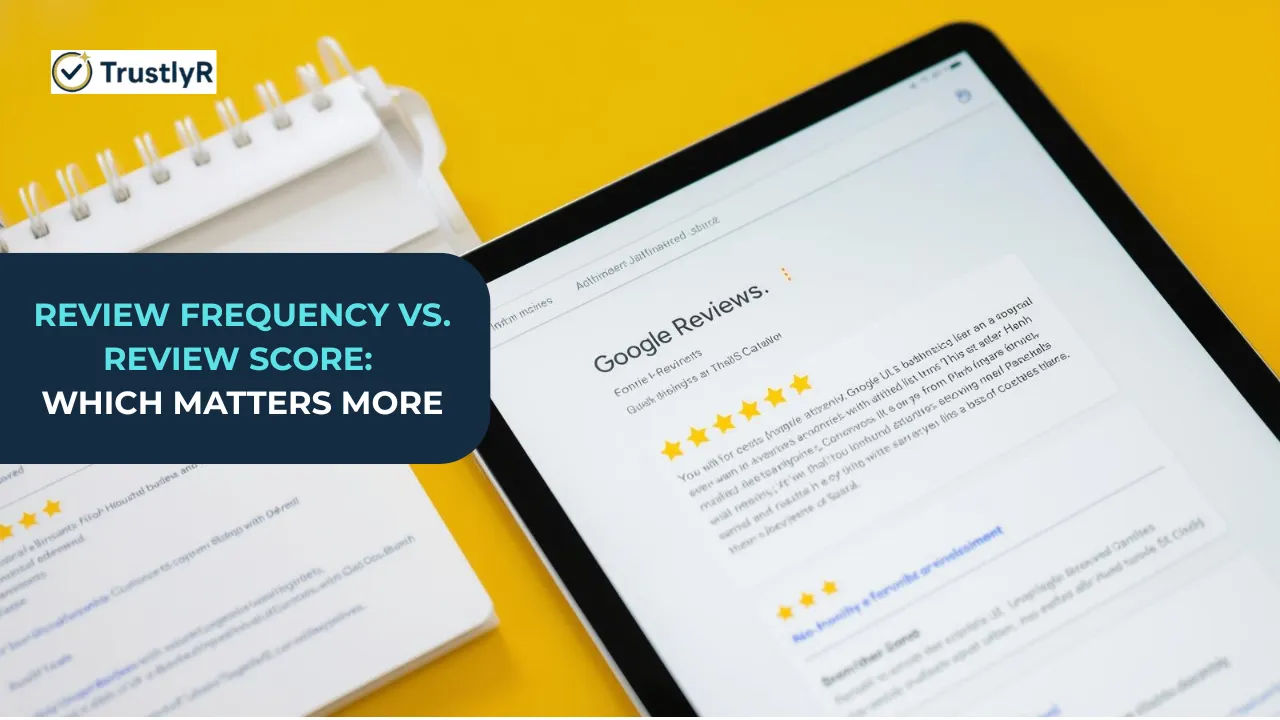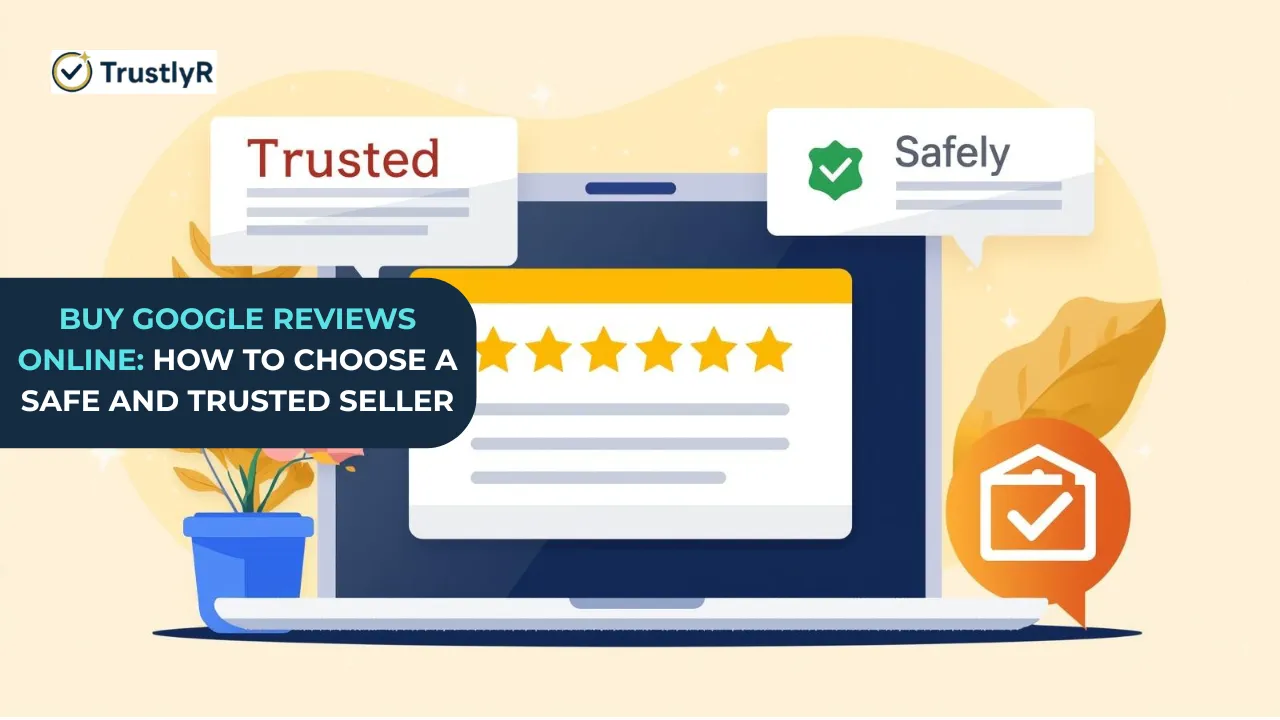Every local business is aware of the power of Google reviews. They shape trust, visibility, and even where customers choose to spend their money.
There is, however, one question that many business owners still get muddled about. What matters more: review frequency or review score? How many reviews do you receive (and when), or how high is your rating? Is it better to have a perfect 5.0 score that hasn't changed in a year or a 4.5 score that gets five new reviews every week?
Let’s dive into it. In this blog, we will discuss how both play out for your business, how Google sees them, and how you can address both wisely.
Learning the Fundamentals
Before we determine which is more significant, let's know what each one is actually defined as.
What is Review Frequency
Review frequency refers to how frequently customers post reviews for your business.
For instance:
- A restaurant that receives 15 new reviews each week has a high review frequency.
- A salon that receives just 2 reviews in 3 months has low review frequency.
Review frequency reflects your business's activity level and engagement. It tells potential customers that your business is alive, active, and trusted by many people recently, and not just in the past.
What is Review Score
Your review score represents the average rating given by people. It is normally displayed as stars (such as 4.9 ★ or 3.1 ★).
It indicates how happy your customers are. Because
- Good score = Customers are happy with your service.
- Low score = Customers are not happy.
83% of consumers say that reviews must be recent and relevant in order to care about them.
Review Frequency vs. Review Score: What Really Matters More
Let’s say there are two local businesses.
- Business A has 4.9 stars but only 5 reviews (and the last one was 10 months ago).
- Business B has 4.6 stars but gets fresh reviews every week. Now it has over 200 reviews.
Which one would you choose as a customer? Most people would go with Business B. Why? The reason is simple enough. Regular and recent feedback looks real and trustworthy.
A business that gets reviews often feels more authentic than one with only a few perfect ones from long ago. A high review score also plays a big role. But let’s look at both sides.
Why Review Frequency Matters
1. Recency = Relevance
Think of reading a restaurant review from the year 2020. Do you think it will be relevant today after so many years? Recent reviews will show that customers are still coming back, happy, and referring you.
2. Google Values Activity
Google's local ranking algorithm gives value to fresh reviews. A business that receives regular new reviews will be deemed as more active and trustworthy.
3. Consistent Trust
When customers see a consistent number of reviews being added, it shows that you didn't just get lucky once with just one good review. Rather, it indicates that you're always great, not sometimes.
4. Protects You from Bad Reviews
If you have 500 total reviews and get a bad one, it won’t hurt much. But if you have only 10 reviews and get one bad review. What happens then? Well, then your average drops fast. Frequent reviews dilute the impact of negative feedback.
Why Review Scores Matter
1. First Impression
The review score is the first thing people see. When someone Googles your business, those golden stars appear right next to your name. A 4.8 looks impressive. But a 3.1 score? Not so much.
2. Trust
People trust numbers. A good score tells customers that this business is great. It acts like a personal recommendation from many strangers.
3. Conversion Power
When your score is high, people are more likely to click your listing, call you, or visit your store.
That means better conversion, more leads, and more sales.
4. Search Ranking Influence
Google considers overall star ratings as part of your business reputation. A very low average score can pull you down in local rankings.
So, again coming back to our question, which one is more important? Do you want to know the truth? The truth is that you need both. You can’t only chase a high review score and ignore review frequency. You also can’t get frequent reviews and ignore quality.
However, here’s a good way to think about it:
How Google Sees Review Frequency & Score
Google's local algorithm considers three main factors when ranking businesses:
- Relevance: Is your business the right match for what people are looking for online?
- Distance: How far away is your business from the person searching?
- Prominence: How good your company looks online.
Google reviews influence the "Prominence" score. Here’s how:
- The latest reviews inform Google that you're active and reputable.
- A high average rating informs Google that your customers are happy.
Together, they make your listing stronger and more visible. So if you only focus on the review score but stop getting new reviews, you’ll lose traction over time. But if you only get frequent reviews with mixed ratings, people won’t choose you.
How to Balance Review Frequency vs. Review Score
To improve your reputation online, you need to start balancing your review frequency and review score using the following strategy:
1. Check Your Reviews
- How many total reviews are there?
- What's your review score?
- When was the last time you received a review?
2. Identify & Fix Weak Spots
- What to do if your rating is less than 4? Start enhancing your service and getting positive customer feedback. You can ask customers to leave feedback after every service.
- What to do if your reviews are outdated or low in number? Focus on collecting reviews on a regular basis.
3. Create Monthly Goals
For example:
- At least 10 new reviews every month.
- Maintain a 4.5+ average rating.
4. Automate the Process
- Instead of doing everything manually, use automation. Automate sending reminders seeking reviews, sending responses, and monitoring progress.
5. Respond To Each Reviewer
- Always thank the reviewer (good and bad both). Respond to criticism politely.
6. Train Your Team
- Remind your staff to ask satisfied customers for reviews.
7. Track Progress
- You must monitor trends on a regular basis and keep enhancing strategies as needed.
8. Improve Consistently
- Don’t forget to enhance your product or service quality based on the reviews you receive.
Conclusion
So, the debate of review frequency vs. review score isn’t about choosing one. It’s about maintaining balance. A great rating gets attention. But consistent reviews earn trust. Between review frequency and score, both matter. If you manage both, you’ll attract more customers, rank higher on Google, and build a reputation that lasts.
If your reviews have slowed down lately, that’s a quiet signal that it’s time to restart the conversation with your customers. Ask, remind, and stay present. This is because your online reputation isn’t defined by a single star. It’s built by the pattern behind them.
How TrustlyR Can Improve Your Review Frequency & Score
At TrustlyR, we understand how reviews shape the image of your business. If you are a restaurant owner, salon manager, gym owner, or any local business owner, our platform helps you buy Google reviews safely. With our services, we ensure that you focus on running your business while we help with your online reputation management.
If you want a helping hand, we can make it all easy for you. From getting more reviews to improving your ratings, we can handle it all. Contact us and learn how authentic reviews can keep your local business ahead of the curve.








